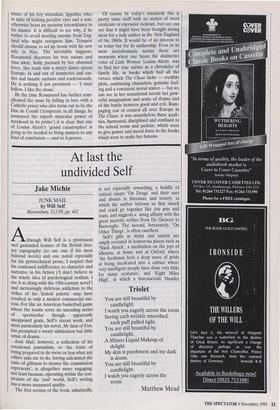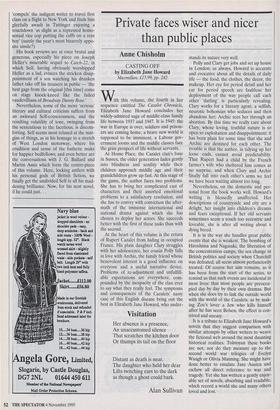At last the undivided Self
Jake Michie
JUNK MAIL by Will Self Bloomsbury, £12.99, pp. 402 Although Will Self is a prominent and garlanded feature of the British liter- ary topography (to use one if his most beloved words) and one noted especially for his pyrotechnical prose, I suspect that his confessed indifference to character and narrative in his fiction ('I don't believe in the whole idea of psychological realism. I see it as dying with the 19th-century novel') and increasingly delirious addiction to the riches of his 'lexical palette' may have resulted in only a modest commercial suc- cess. For like an American basketball game where the teams score an unending series of spectacular though apparently unopposed goals, Self s recent work, and most particularly his novel, My Idea of Fun, has prompted a weary admiration but little sense of drama.
Junk Mail, however, a collection of his occasional journalism, or 'the fruits of being prepared to do more or less what any editor asks me to do, having calculated the ratio of glibness to money the commission represents', is altogether more engaging, not least because, operating within the con- straints of the 'real' world, Self's writing has a more measured quality. The first section of the book, admittedly, is not especially rewarding; a huddle of critical essays 'On Drugs' and their uses and abuses in literature and society, in which the author informs us that smack and crack go together like foie gras and toast, and suggests a smug affinity with the great narcotic scribes from De Quincey to Burroughs. The second, fortunately, 'On Other Things', is often excellent.
Self s gifts as stylist and satirist are amply revealed in humorous pieces such as `Slack Attack', a meditation on the joys of idleness, at home and at Oxford, where `the freshman feels a deep sense of pride at being inculcated into a culture where very intelligent people have done very little for many centuries', and 'Eight Miles High', in which a bureaucratic blunder `compels' the indigent writer to travel first class on a flight to New York and finds him gleefully awash in Tattinger enjoying a touchdown 'as slight as a repressed homo- sexual vice cop putting the cuffs on a rent boy' (surely the year's most bizarrely appo- site simile?) His book reviews are at once brutal and generous, especially his piece on Joseph Heller's miserable sequel to Catch-22, in which Self, having obviously worshipped Heller as a lad, evinces the stricken disap- pointment of a son watching his drunken father take off his trousers in public — 'the best gags from the original [this time] come on stage knock-kneed like the failed vaudevillians of Broadway Danny Rose.'
Nevertheless, some of the more 'serious' literary and cultural criticism suffers from an awkward Self-consciousness, and the resulting volatility of tone, swinging from the sententious to the facetious, is discom- forting. Self seems most relaxed at the mar- gins of things, as in his homage to a stretch of West London motorway, where his erudition and sense of the bathetic make for happier bedfellows; and even better are the conversations with J. G. Ballard and Martin Amis which form the centre-piece of this volume. Here, locking antlers with his personal gods of British fiction, we finally get the undivided Self in all his mad- dening brilliance. Now, for his next novel, if he could just.. .











































































 Previous page
Previous page